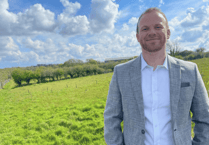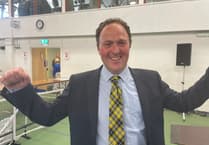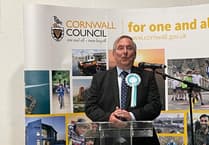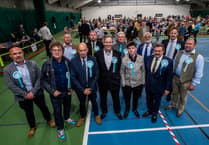Following on from January’s Bude-Stratton full town council meeting, councillors have been awaiting a presentation on a potential new and improved skatepark at the current site, adjacent to Crooklets beach car park.
Councillors voiced their support for the skatepark to be built, whilst also addressing some of the environmental issues that could arise.
It had been decided that the town clerk should start discussions with Cornwall Council to acquire the freehold of the existing skatepark and the acquisition of additional land to create a new skatepark and multi-use area.
At the council meeting on Thursday, February 6, councillors received an informative talk from Russell Holbert, the director of Maverick Skateparks Limited.
Maverick Skateparks Limited develop and build skateparks as well as supporting councils throughout the process. Russell is also on the board for Skate England and has offered his personal support for the Bude project, as he explained that his sister is a resident of Bude and would be motivated to see the development happen.
He began by explaining his experience within the sector. “I go into schools and colleges all the time and 90 to 95 per cent of people say they are using some form of wheeled equipment, students, even teachers tell me that areas are crying out for people to recreate.
“At this moment in time there are now expertise to create these structures — 12 years ago we didn’t.
“I was involved in the Newquay project for over ten years to see it through.
“I would be happy to support the Bude skate project. If there was community thinking that this would be a good thing for Bude — because this is my sister’s home town, I would be happy to help.
“I wouldn’t ask for any money — and if this were to happen hopefully, it could be built.
“I’m here to answer any questions, I’ve been doing this a lifetime, I’m a surfer and a skater and this is a big part of my life.”
Cllr Paul Tilzey was keen to address where the funding for this project would come from, the insurance, and asked what sort of maintenance would be required. Russell explained that most of this would be made up from external sources.
He said: “In projects I have previously overseen, the town council would contribute some funding to show other investors that they are committed to the project.
“There are a range of funding sources available such as the Community Asset Fund; The Lottery Fund; and money would be available off the back of the Tokyo Olympics.”
He continued: “There are hundreds of ways out there. I raised £75,000 for Newquay’s project.”
It was then explained that this would be a lifetime project and would involve ‘virtually no maintenance’. Russell added: “All it would be is sweeping leaves and maybe picking up the occasional bit of rubbish. Sometimes there might be chip in the concrete, but by using spray-on concrete in its construction, it can be filled in by anyone.
“The insurance would have to come from the council, however, if you are worried about that, it can be included in the initial cost.”
The new skatepark would be made from spray-on concrete and Cllr Frank Partridge asked for some clarification. He said: “I might be the only one here that doesn’t know, but what exactly is spray concrete? How much do you spray?”
It was explained that the spray could be moulded into any shape possible, utilising skateboarders in the process so that each of the shapes are moulded to suit the needs.
Russell added: “Essentially it’s a technical plastering job. It is completely organic, you can build it up, down, anyway — you can do it any way you like. It is quite unique in many aspects.”
In January, there had been a long discussion about the effects it would have on the environment when using concrete for a new skatepark. Cllr Robert Uhlig brought this issue up again. He said: “We have declared a climate emergency and obviously using concrete will be a huge environmental impact. What are your thoughts about this?”
Russell responded: “My view is that it will be here a long time after we’re gone. A concrete park is a once in a lifetime thing, the material used can by crushed and reused. You can source the materials relatively locally.
“The carbon footprint on the environment is offset by the fact it’s there and you don’t need to rebuild it again and again. It’s not perfect, I get that, but I counter that with the life expectancy of it, plus having no maintenance.”
Several of the Bude councillors wanted to know how long the process would take from start to finish.
It was explained that initially a tender would have to be run and that utilising a company like Maverick could be beneficial as they would take over most of the planning procedures.
Russell added: “You would say this is our site, this is our cost, there is issues with location (hypothetically) service checks, look at the power lines, public cars, ground behind it. That’s the job of the contractor, look at the design, come back with references, the health and safety nature of how they would approach the project. Ultimately without the partner, the council get this done.”
Russell said he was happy to return to Bude and give the council an idea of what land they would need, which would help to determine the cost for such a project, enabling the council to start the process of applying for funding.





Comments
This article has no comments yet. Be the first to leave a comment.